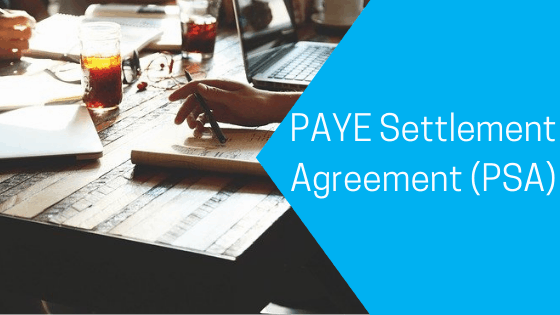An introduction to the PAYE Settlement Agreement.
“A PAYE Settlement Agreement (PSA) allows you to make one annual payment to cover all the tax and National Insurance due on minor, irregular or impractical expenses (or benefits) for your employees.”
What does HMRC’s definition mean in practice? Minor and irregular are easy enough to interpret, but they will only need to be included if they aren’t already included within payroll or submitted on a P11d. As for “impractical” HMRC is referring to costs which are difficult to attribute to an individual.
For example:
- Company A provides a company car for Employee A,
- This is specifically for Employee A
- The costs can be identified and directly attributed to Employee A
- This is included on a P11D, if not grossed up through PAYE
- This is not subject to a PSA
- Company A pays provides healthcare membership for Employee B
- This is specifically for Employee B
- The costs can be identified and directly attributed to Employee B
- This is included on a P11D, if not grossed up through PAYE
- This is not subject to a PSA
- Company A takes Employee A and Employee B on an all-expenses-paid company holiday as a reward for work completed. The holiday package includes travel, lodging, meals and entertainment.
- Each cost may be difficult to specifically identify the benefit per employee, as many costs may effectively be “shared” across all recipients
- The costs, therefore, cannot be easily identified and directly attributed to Employee A, and likewise, the same issue occurs for Employee B
- At the moment, no tax has been paid, but this is a benefit-in-kind to both employees
- This is when the costs are subject to a PSA
- Company A rents a company owned holiday property at a subsidised rent to an employee. Say Market value rent in peak season is £1500 per week and the employee pays £500 per week. The employee pays all other travel costs.
- This is not typically a PSA expense. It is not small, irregular, infrequent or difficult to measure per employee
- It is arguable that it is easy to calculate the cash equivalent benefit to the employee and this could be taxed as a benefit in kind on a P11D
- However, as an employer, you may not want to pass that cost onto your employee.
- It is possible, but not guaranteed that you could enter into a PSA with HMRC so the employer pays the BIK tax due on behalf of the employee at the end of the tax year
- The employer would write to HMRC, outline the situation and ask if they will allow the tax and NI payable on subsidised holiday property rent to be taxed under a PSA
- Why might HMRC agree? What is in it for them? Well, mostly speed and efficiency. A) they get the tax paid in a lump sum by the employer and B) the employer would pay it sooner under a PSA rather than wait for it to be recovered through individual employee tax codes.
- Costs may be subject to a PSA is agreed by HMRC
One thing to note, is that any staff who have already had all underlying benefits grossed-up through payroll or submitted on a P11D will not require a PSA.
The company then makes additional tax and NI payments to HMRC in order to cover the employee’s relevant benefits. The employees themselves, incur no cost.
How does a PAYE Settlement Agreement (PSA) work?
In order to calculate a PSA, we need the following information:
- The total cost of the relevant benefits
- So following on from our holiday example, if flights cost £1500, hotels cost £1500, meals cost £500 and entertainment cost £500 we would base calculations on £4000
- The number of employees who received the benefit:
- Who are Basic rate tax payers
- Who are Higher rate tax payers
- Who are Additional rate tax payers
The total cost will then be equally distributed to each employee, and taxed in line with their corresponding tax bracket.
- Following on from our previous example
- Employee A would have £2000 of cost assigned to them
- Employee B would have £2000 of cost assigned to them.
It’s then the case of grossing up their pay for purposes of the PSA, so we may determine how much tax is due on their benefit. If Employee A is a higher rate taxpayer, and Employee B is basic rate taxpayer, then they will each be charged at 40% and 20% respectively.
Employer’s NI will then also be applicable to all earnings.
A PSA will need to be requested and agreed with HMRC by 19th July, after the corresponding tax year-end. The payment of which would then fall due by 19th Oct once final figures have been confirmed.
How much will it cost me?
Whether you’ve already incurred the cost, or are forward-planning, it’s always helpful to have an idea as to the additional costs you are likely to be subject to.
For information purposes, the table below outlines the relevant tax and NI charges the Employer would incur based on an employee’s benefits. The table assumes the cost for an individual employee.
- As a final extension to our example:
- Employee A
- is a higher rate taxpayer
- who would have received £2000 worth of benefits (£4000 / 2)
- the relevant cost for this employee is £1793.33
- Employee B
- is a basic rate taxpayer
- who would have received £2000 worth of benefits (£4000 / 2)
- the relevant cost for this employee is £845.00
- In total
- The company would incur £2638.33 worth of additional cost
- = (£1793.33 x 1) + (£845.00 x 1)
- This means a £4000.00 all-costs-included holiday has a fully realised cost of £6638.33
- Employee A
| Examples of total costings for an employee (TAX / NI): | |||
| Benefit | Basic Rate Employee | Higher Rate Employee | Additional Rate Employee |
| £1,000.00 | £422.50 | £896.67 | £1,069.09 |
| £2,000.00 | £845.00 | £1,793.33 | £2,138.18 |
| £3,000.00 | £1,267.50 | £2,690.00 | £3,207.27 |
| £4,000.00 | £1,690.00 | £3,586.67 | £4,276.36 |
| £5,000.00 | £2,112.50 | £4,483.33 | £5,345.45 |
| £6,000.00 | £2,535.00 | £5,380.00 | £6,414.55 |
| £7,000.00 | £2,957.50 | £6,276.67 | £7,483.64 |
| £8,000.00 | £3,380.00 | £7,173.33 | £8,552.73 |
| £9,000.00 | £3,802.50 | £8,070.00 | £9,621.82 |
| £10,000.00 | £4,225.00 | £8,966.67 | £10,690.91 |
| £11,000.00 | £4,647.50 | £9,863.33 | £11,760.00 |
| £12,000.00 | £5,070.00 | £10,760.00 | £12,829.09 |
| £13,000.00 | £5,492.50 | £11,656.67 | £13,898.18 |
| £14,000.00 | £5,915.00 | £12,553.33 | £14,967.27 |
| £15,000.00 | £6,337.50 | £13,450.00 | £16,036.36 |
| £16,000.00 | £6,760.00 | £14,346.67 | £17,105.45 |
| £17,000.00 | £7,182.50 | £15,243.33 | £18,174.55 |
| £18,000.00 | £7,605.00 | £16,140.00 | £19,243.64 |
| £19,000.00 | £8,027.50 | £17,036.67 | £20,312.73 |
| £20,000.00 | £8,450.00 | £17,933.33 | £21,381.82 |
If you have any queries about tax on benefits for your employees, please contact us.





